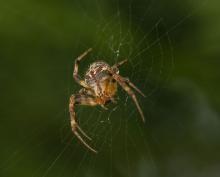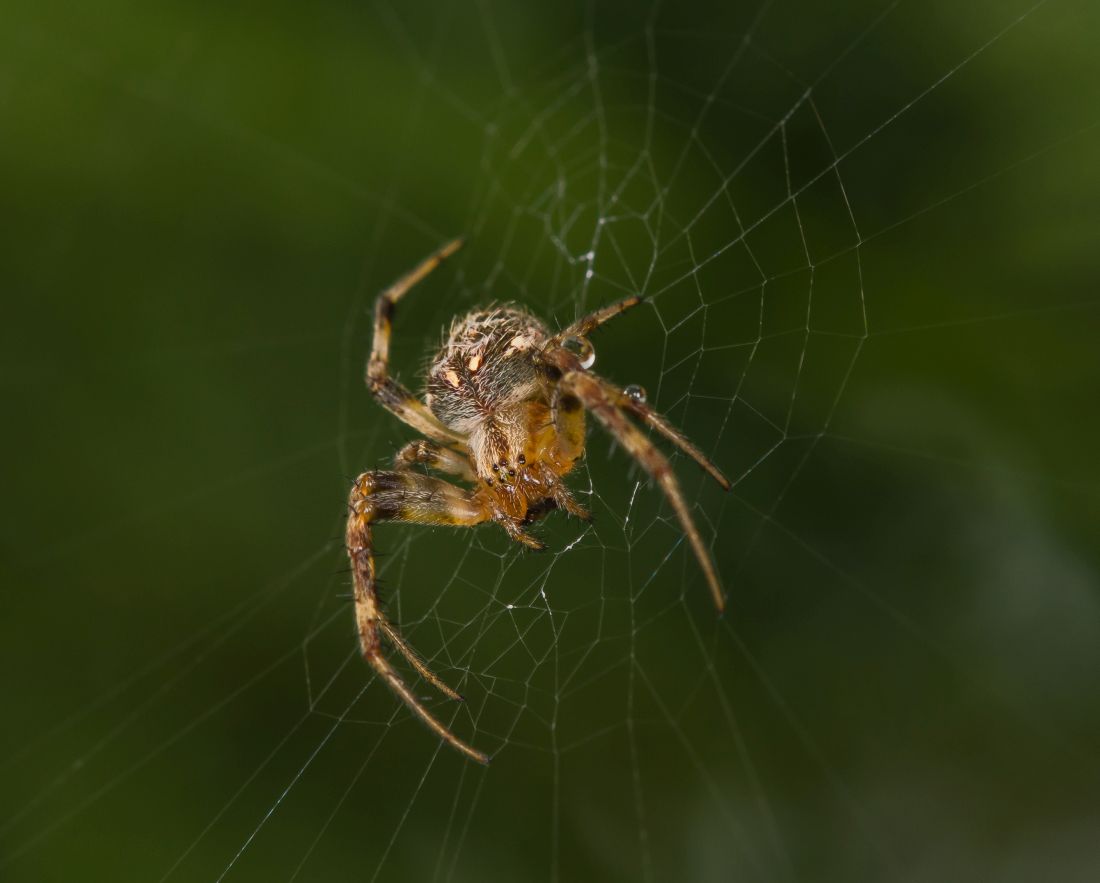User login
Endgame for arachnophobia
We think Tony Stark would like this creative solution for spider and ant phobias. Comic book movies have now infiltrated every aspect of culture, including serious scientific research. And let’s be honest – more than one scientist has been inspired to go into their fields by Bruce Banner, Stark, or maybe even Doctor Octopus (no judgment).
A group of (possibly mad) scientists has tested exposure therapy for spider and ant phobias in people by showing participants the Spider-Man and Ant-Man movies. While the viewing material may not be totally scientifically accurate, researchers found that watching seven seconds of Spider-Man 2 or Ant-Man reduced spider and ant phobia by 20%.
The participants were specifically exposed to ants and spiders in the context of the movies, so surprisingly the phobia reduction had nothing to do with Tobey Maguire or Paul Rudd.
Old poop, new discovery
Here at LOTME, we like us some good bathroom humor. And don’t worry, we won’t ever change. In this week’s edition of the Wonderful World of Poop, we take you to Texas, 1,500 years ago. The sky was bigger, the air was fresher, and the humans of the Lower Pecos region were as hardcore as you can get. A recent re-examination of coprolite samples taken from the region found one interesting chunk of poop-rock that contained an entire rattlesnake.
Now, the presence of snake bits in early human poo is not that crazy; people ate (and still eat) snakes. The appearance of a centimeter-long fang, scales, and bones, however, did take the researchers by surprise. Why would someone eat a snake? Was it an ancient way to inoculate against snake venom? Or perhaps crunchy snake fangs were the world’s earliest version of a Cheeto?
In fact, researchers hypothesized that this dietary behavior was not normal for the people of the Lower Pecos, and most likely was more ceremonial. You know, the casual eating-a-full-snake ceremony.
Will Texans embrace this ceremony of their past and start chomping on rattlers? Who’s to say? All we know is that poop is the gift that keeps on giving.
A new way to soil yourself
If you’re reading this, we can say with some certainty that you managed to survive another Tax Day. Congratulations! But there’s still Benjamin Franklin’s other ultimate certainty of life. You know … the big sleep, the last roundup, assume room temperature, buy the farm, shuffle off this mortal coil, give up the ghost, and so on.
What are you going to do about that?
A big question, for sure, so let’s just focus on the earthly remains. A company called Recompose has a new alternative to burial and cremation, something they’ve dubbed “natural organic reduction” and others have described as “human composting” or “accelerated decomposition.” In a pilot project last year at Washington State University in Pullman, the Recompose process transformed the bodies of six donors to soil in 4-7 weeks, AP reported.
The company says that natural organic reduction is much more environmentally friendly than current practices, creating a cubic yard of soil per person, and that “friends and family are welcome to take some (or all) home to grow a tree or a garden.”
A garden sounds nice, or maybe something indoors. Just think of the potted plant possibilities: daisies (to push up), a Venus flytrap (the organic reduction continues), some poison ivy (a gift for people you don’t like), or maybe roses. Who wouldn’t want to come out of death smelling like a rose?
San Francisco vs. illegal dumping
Maybe you’re not quite ready to commit to using human remains as compost to fertilize your garden. Perhaps you want to start off only using human poop as fertilizer, see how that goes before sprinkling Grandma all over your tulips.
Well, if you’re looking for a sweet deal, we’re certain San Francisco can work something out with you because, in the past 7 years, incidence of human feces in public places within the city has quintupled, rising from 5,500 reported cases in 2011 to 28,100 cases in 2018.
The problem, likely related to an increasing homeless population who can’t afford San Francisco’s exorbitant rental prices and have limited access to public restrooms, is so bad that the city commissioned a “Poop Patrol” in the summer of 2018 to wipe down some of the poorer, more suspect neighborhoods.
While the upstanding members of the Poop Patrol are almost certainly doing a fine job, it’s probably safe to say that human fecal clean-up is an industry ripe for disruption.
We look forward to the inevitable Silicon Valley start-up and for the media to hail it as “Uber, but for poop.”
Endgame for arachnophobia
We think Tony Stark would like this creative solution for spider and ant phobias. Comic book movies have now infiltrated every aspect of culture, including serious scientific research. And let’s be honest – more than one scientist has been inspired to go into their fields by Bruce Banner, Stark, or maybe even Doctor Octopus (no judgment).
A group of (possibly mad) scientists has tested exposure therapy for spider and ant phobias in people by showing participants the Spider-Man and Ant-Man movies. While the viewing material may not be totally scientifically accurate, researchers found that watching seven seconds of Spider-Man 2 or Ant-Man reduced spider and ant phobia by 20%.
The participants were specifically exposed to ants and spiders in the context of the movies, so surprisingly the phobia reduction had nothing to do with Tobey Maguire or Paul Rudd.
Old poop, new discovery
Here at LOTME, we like us some good bathroom humor. And don’t worry, we won’t ever change. In this week’s edition of the Wonderful World of Poop, we take you to Texas, 1,500 years ago. The sky was bigger, the air was fresher, and the humans of the Lower Pecos region were as hardcore as you can get. A recent re-examination of coprolite samples taken from the region found one interesting chunk of poop-rock that contained an entire rattlesnake.
Now, the presence of snake bits in early human poo is not that crazy; people ate (and still eat) snakes. The appearance of a centimeter-long fang, scales, and bones, however, did take the researchers by surprise. Why would someone eat a snake? Was it an ancient way to inoculate against snake venom? Or perhaps crunchy snake fangs were the world’s earliest version of a Cheeto?
In fact, researchers hypothesized that this dietary behavior was not normal for the people of the Lower Pecos, and most likely was more ceremonial. You know, the casual eating-a-full-snake ceremony.
Will Texans embrace this ceremony of their past and start chomping on rattlers? Who’s to say? All we know is that poop is the gift that keeps on giving.
A new way to soil yourself
If you’re reading this, we can say with some certainty that you managed to survive another Tax Day. Congratulations! But there’s still Benjamin Franklin’s other ultimate certainty of life. You know … the big sleep, the last roundup, assume room temperature, buy the farm, shuffle off this mortal coil, give up the ghost, and so on.
What are you going to do about that?
A big question, for sure, so let’s just focus on the earthly remains. A company called Recompose has a new alternative to burial and cremation, something they’ve dubbed “natural organic reduction” and others have described as “human composting” or “accelerated decomposition.” In a pilot project last year at Washington State University in Pullman, the Recompose process transformed the bodies of six donors to soil in 4-7 weeks, AP reported.
The company says that natural organic reduction is much more environmentally friendly than current practices, creating a cubic yard of soil per person, and that “friends and family are welcome to take some (or all) home to grow a tree or a garden.”
A garden sounds nice, or maybe something indoors. Just think of the potted plant possibilities: daisies (to push up), a Venus flytrap (the organic reduction continues), some poison ivy (a gift for people you don’t like), or maybe roses. Who wouldn’t want to come out of death smelling like a rose?
San Francisco vs. illegal dumping
Maybe you’re not quite ready to commit to using human remains as compost to fertilize your garden. Perhaps you want to start off only using human poop as fertilizer, see how that goes before sprinkling Grandma all over your tulips.
Well, if you’re looking for a sweet deal, we’re certain San Francisco can work something out with you because, in the past 7 years, incidence of human feces in public places within the city has quintupled, rising from 5,500 reported cases in 2011 to 28,100 cases in 2018.
The problem, likely related to an increasing homeless population who can’t afford San Francisco’s exorbitant rental prices and have limited access to public restrooms, is so bad that the city commissioned a “Poop Patrol” in the summer of 2018 to wipe down some of the poorer, more suspect neighborhoods.
While the upstanding members of the Poop Patrol are almost certainly doing a fine job, it’s probably safe to say that human fecal clean-up is an industry ripe for disruption.
We look forward to the inevitable Silicon Valley start-up and for the media to hail it as “Uber, but for poop.”
Endgame for arachnophobia
We think Tony Stark would like this creative solution for spider and ant phobias. Comic book movies have now infiltrated every aspect of culture, including serious scientific research. And let’s be honest – more than one scientist has been inspired to go into their fields by Bruce Banner, Stark, or maybe even Doctor Octopus (no judgment).
A group of (possibly mad) scientists has tested exposure therapy for spider and ant phobias in people by showing participants the Spider-Man and Ant-Man movies. While the viewing material may not be totally scientifically accurate, researchers found that watching seven seconds of Spider-Man 2 or Ant-Man reduced spider and ant phobia by 20%.
The participants were specifically exposed to ants and spiders in the context of the movies, so surprisingly the phobia reduction had nothing to do with Tobey Maguire or Paul Rudd.
Old poop, new discovery
Here at LOTME, we like us some good bathroom humor. And don’t worry, we won’t ever change. In this week’s edition of the Wonderful World of Poop, we take you to Texas, 1,500 years ago. The sky was bigger, the air was fresher, and the humans of the Lower Pecos region were as hardcore as you can get. A recent re-examination of coprolite samples taken from the region found one interesting chunk of poop-rock that contained an entire rattlesnake.
Now, the presence of snake bits in early human poo is not that crazy; people ate (and still eat) snakes. The appearance of a centimeter-long fang, scales, and bones, however, did take the researchers by surprise. Why would someone eat a snake? Was it an ancient way to inoculate against snake venom? Or perhaps crunchy snake fangs were the world’s earliest version of a Cheeto?
In fact, researchers hypothesized that this dietary behavior was not normal for the people of the Lower Pecos, and most likely was more ceremonial. You know, the casual eating-a-full-snake ceremony.
Will Texans embrace this ceremony of their past and start chomping on rattlers? Who’s to say? All we know is that poop is the gift that keeps on giving.
A new way to soil yourself
If you’re reading this, we can say with some certainty that you managed to survive another Tax Day. Congratulations! But there’s still Benjamin Franklin’s other ultimate certainty of life. You know … the big sleep, the last roundup, assume room temperature, buy the farm, shuffle off this mortal coil, give up the ghost, and so on.
What are you going to do about that?
A big question, for sure, so let’s just focus on the earthly remains. A company called Recompose has a new alternative to burial and cremation, something they’ve dubbed “natural organic reduction” and others have described as “human composting” or “accelerated decomposition.” In a pilot project last year at Washington State University in Pullman, the Recompose process transformed the bodies of six donors to soil in 4-7 weeks, AP reported.
The company says that natural organic reduction is much more environmentally friendly than current practices, creating a cubic yard of soil per person, and that “friends and family are welcome to take some (or all) home to grow a tree or a garden.”
A garden sounds nice, or maybe something indoors. Just think of the potted plant possibilities: daisies (to push up), a Venus flytrap (the organic reduction continues), some poison ivy (a gift for people you don’t like), or maybe roses. Who wouldn’t want to come out of death smelling like a rose?
San Francisco vs. illegal dumping
Maybe you’re not quite ready to commit to using human remains as compost to fertilize your garden. Perhaps you want to start off only using human poop as fertilizer, see how that goes before sprinkling Grandma all over your tulips.
Well, if you’re looking for a sweet deal, we’re certain San Francisco can work something out with you because, in the past 7 years, incidence of human feces in public places within the city has quintupled, rising from 5,500 reported cases in 2011 to 28,100 cases in 2018.
The problem, likely related to an increasing homeless population who can’t afford San Francisco’s exorbitant rental prices and have limited access to public restrooms, is so bad that the city commissioned a “Poop Patrol” in the summer of 2018 to wipe down some of the poorer, more suspect neighborhoods.
While the upstanding members of the Poop Patrol are almost certainly doing a fine job, it’s probably safe to say that human fecal clean-up is an industry ripe for disruption.
We look forward to the inevitable Silicon Valley start-up and for the media to hail it as “Uber, but for poop.”




